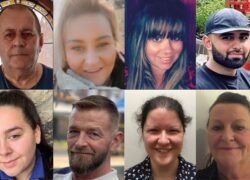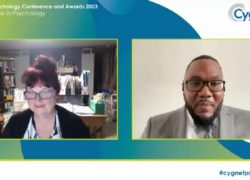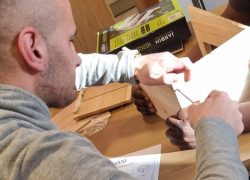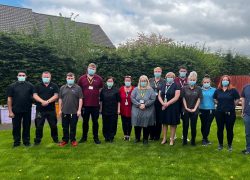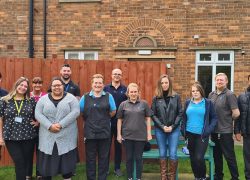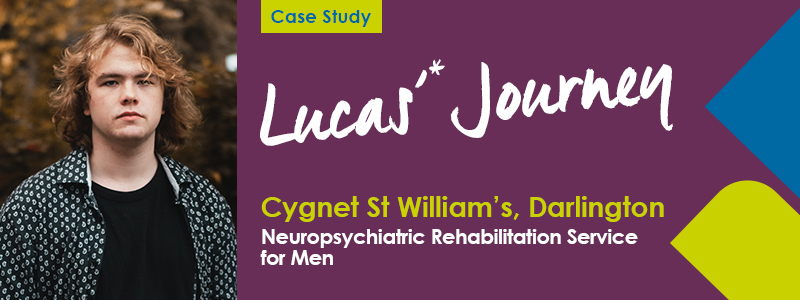
Lucas’ History
Lucas* was admitted to Cygnet St William’s, in 2021 from a NHS mental health unit. He had previously had a number of placements following a Traumatic Brain Injury (TBI) in February 2019 as a result of a significant fall. He sustained multiple injuries, fractures throughout the body, depressed skull fracture, bilateral acute subdural haematoma, (ASDH) and midline shift with traumatic subarachnoid haemorrhage (SAH). As a result, Lucas underwent several surgeries. Prior to this Lucas had a significant mental health history with several drug-induced psychotic episodes.
Lucas’ accident caused him to have cognitive difficulties alongside limited range of movement within his wrists and hands. He had memory problems and executive
functioning difficulties affecting his reasoning and judgement, planning and problem solving. As a result of this he became agitated and frustrated, especially when he was unable to understand the rationale for certain decisions, felt misunderstood or if he was unable to complete activities of daily living independently. Lucas could be both verbally and physically aggressive at these times.
When Lucas Came to Us
Upon admission to Cygnet St William’s, Lucas was sectioned under the Mental Health Act. He became increasingly agitated when he perceived his needs were not being met immediately, or when he had forgotten where he had placed certain items.
He found it difficult to understand why he was unable to return to live with his family, which resulted in him becoming angry at the staff team. Initially he did not wish to engage with his rehabilitation programme. Lucas struggled at times with his mental health and would become paranoid about the people around him, and at times experienced auditory hallucinations. Over time, he slowly built relationships with staff members at St William’s and became more willing to participate in activities and interventions, as he felt more able to trust the team.
Lucas’ Care
The multi-disciplinary team (MDT) used a step-by-step approach to build a therapeutic relationship with Lucas, working closely alongside the nursing and support worker teams. Lucas worked with the Occupational Therapist, Speech and Language Therapist and Psychology team. Following our neuropsychiatry model of care, Lucas completed numerous assessments with the MDT. He engaged in various therapies coordinated by the MDT to discuss the level of his brain injury, rehabilitation, recovery, and his insight into the support he requires.
It was paramount that activities offered were focused around Lucas’ interests. He found attending the gym meaningful, therefore the MDT made structured plans and therapies based around this to improve community skills like; road safety, social interaction boundaries, and emotional regulation. Lucas also wanted to gain skills in cooking, and so he was encouraged to engage in 1-1 sessions starting with simple cookies and cake making, progressing to shop and cook activities following particular recipes. After a period of time, there was a marked improvement in his ability to understand, process, sequence, and execute the set of actions in the particular order detailed within the recipe.
Lucas was also supported to maintain contact with his family by engaging in home leave with staff support, even working up to going out for walks with family independently.
Staff provided Lucas with visual social stories to enable him to understand what is expected of him in particular circumstances and why, alongside completing debriefs following any outing, and in particular after incidents. Staff utilised the ‘Antecedent, Behaviour and Consequence’ method. This particular method worked very well with Lucas and there was a notable improvement in his response to certain situations. Therefore, he was discharged from his section and placed on a Deprivation of Liberty (DoLS) authorisation.
Lucas enjoyed participating in activities on and off the unit including accessing the community independently. He was provided with the role of collecting the unit newspapers from the local shop. Each graded approach to his rehabilitation increased not only his skills, but also his self-image and self-esteem. This is evident through comparison of his overall presentation from admission to today.
Lucas Today
As a result of the level of support that Lucas received from the team at Cygnet St William’s, and the hard work he has put into the therapy programme, he is much more independent. The team ensured he was prescribed the correct medication to stabilise his mental health and volatility, as well as supporting Lucas to build new skills and improve cognitive abilities.
He presents as being much happier and is able to listen to rationale and manage his emotions more effectively. Lucas has now been discharged from Cygnet St William’s and is living in a transitional service within the community, where he has his own flat and tends to his own activities of daily living with very minimal support. He attends groups organised by Headway independently, and is now even speaking about wanting to volunteer or get a job. We would like to wish Lucas well for the future – he should be very proud of what he has achieved.
*Name has been changed to protect their identity
